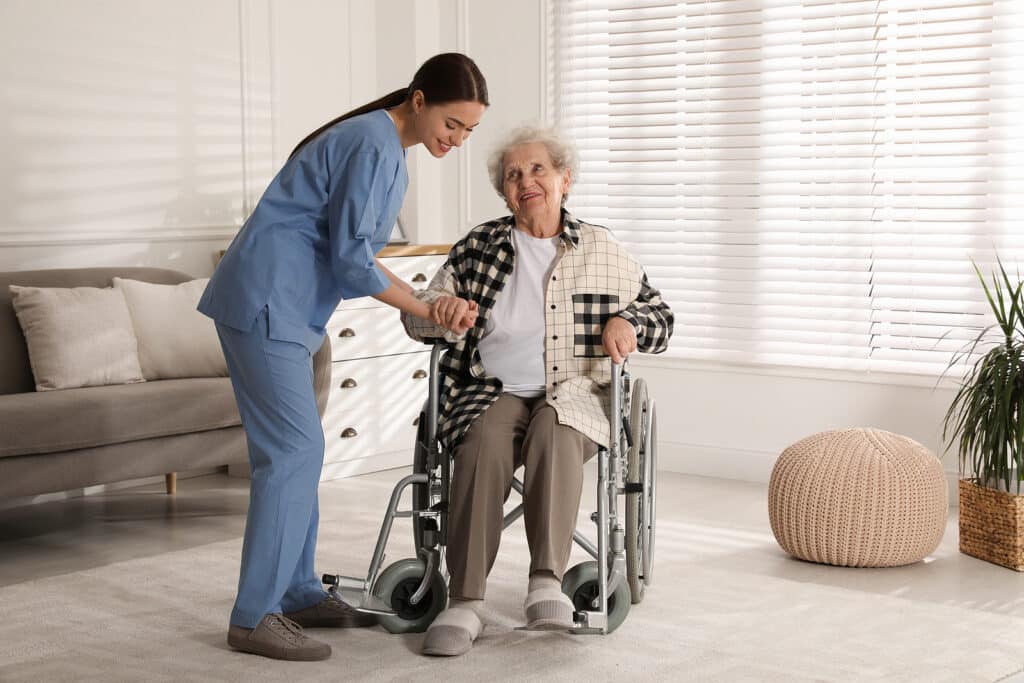It’s important for seniors to know how they can move around so they can keep their freedom and quality of life as they age. As they age, they may lose some of this freedom of movement because of arthritis, joint pain, and other health problems. This can make it hard to get ready for the day, cook meals, and run errands. With support from loved ones and companion care at home, seniors get the support they need. This support also includes access to the right adaptive options, along with mobility devices.
Table of Contents
ToggleWhat Mobility Options Are Best?
Canes, walkers, motorized bikes, and wheelchairs are all among the many mobility choices that seniors have. When choosing what is best, it’s important to consider their needs and preferences. For example, a cane or walker may be a good choice if seniors can still move but need a little extra help. If they have trouble getting around, a motorized bike or wheelchair might be better.
Something else to consider is where they live. The space in the home, layout, and entrance configuration are all critical things to pay attention to.
What About Adaptive Devices?
While mobility options help seniors move around, adaptive devices help them stay connected and involved in their communities. Software for video chatting can let seniors take part in virtual events and activities from the comfort of their own homes. Social media is also a great way for them to keep in touch with friends and family who live far away.
How Can Seniors Gain Access to Mobility and Adaptive Devices?
Seniors must have access to mobility and adaptation devices in order to keep their freedom, improve their quality of life, and keep doing the things they love. Gaining access to these devices can be accomplished in several ways.
- Assessment by Health Care Professionals: The first step is to talk to health care professionals like doctors, physical therapists, or occupational therapists. These experts can determine what seniors need and suggest the right devices.
- Medicare and Health Insurance Coverage: Medicare and other health insurance plans pay for a lot of mobility and aid gadgets. Knowing what insurance covers and what paperwork is needed is key. Some devices may need approval ahead of time or through a certain process. Doctors and nurses can often write prescriptions for mobility and adaptive devices. Seniors will need a prescription for insurance support and to get certain kinds of devices.
- Providers of Durable Medical Equipment (DME): DME providers are experts in selling a wide range of medical devices, such as mobility and assistive devices. Loved ones and seniors can work with these sellers to find the right device once they have a prescription. They can also help seniors file a claim with their insurance company.
It’s important to keep in mind that seniors’ mobility and access to adaptive devices are only a small part of their general health and well-being. Seniors’ quality of life can be improved by encouraging them to stay active, eat well, and keep in touch with their friends and family. In conclusion, knowing offering seniors the tools they need to maintain their freedom takes a team of professionals, including companion care at home, loved ones, and more. When everyone works together, seniors can live a happy, full life.
Providing exceptional Companion Care at Home for seniors and families in the Northern Virginia area, including Arlington, Alexandria, McLean, Reston, Burke, Ashburn, Centreville, Springfield, Manassas, and Oakton. Call today to speak with our caring staff: (703) 272-8838.
Source 1 / Source 2 / Source 3 / Source 4
- Out in the Field with IncrediCare CarePros - April 23, 2024
- Supporting Parkinson’s Clients At Home with IncrediCare Home Care - April 22, 2024
- Senior Home Care Makes Eating Healthy Easy For Seniors - April 19, 2024




